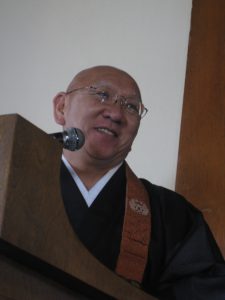
By Rev. Kenjun Kawawata
When the one thought-moment of joy arises,
Nirvana is attained without severing blind passions;
When ignorant and wise, even grave offenders and slanderers of the dharma,
All alike turn and enter shinjin,
They are like waters that, on entering the ocean, become one in taste with it.
(excerpt from Shoshinge, written by Shinran Shonin)
Shinran Shonin says the moment we rejoice with shinjin, deep spiritual awareness, we attain Nirvana without shedding our blind passions. Shinjin means truly awakening to the Buddha’s wisdom and compassion.
Buddhism’s goal, generally speaking, is severing blind passions, attaining a state called Nirvana, and becoming a Buddha. Nirvana is a Sanskrit term that literally means “extinguishing.” It’s derived from a verb meaning “to cool,” or “blow out,” like putting out a candle. Our goal as Buddhists therefore is “blowing out” our blind passions and becoming buddhas.
In Buddhism, blind passion is called bonno in Japanese and has two aspects:
1) Anxieties (anxiousness) of the physical body, which are hunger, thirst, and sense of hot and cold, fear of killing (murder) and inflicting harm.
2) Anguish (agony) of the mind, which includes greed, anger, and foolishness. These are called the Three Poisons in Buddhism. Jealously, envy, conceit, arrogance, doubt, and prejudice (wrong view) are problems of the mind. Anguish comes from our ego and self-centeredness at the core of our value system and priorities. We’re always thinking, “To me, will this be profit or loss,” which causes anguish in our human relations.
In Jodo Shinshu Buddhism, a person filled with blind passion is called bombu.
In his essay, “Notes on Once-calling and Many-calling,” Shinran Shonin wrote, “we are full of ignorance and blind passion, bombu. Our desires are countless, and anger, wrath, jealously, and envy are overwhelming, arising without pause; to the very last moment of life they do not cease, or disappear, or exhaust.” In other words, foolish beings, at their core, are ignorant and filled with blind passion. According to Shinran, this is human nature.
To address this conundrum, Shinran Shonin found an answer in The Larger Sutra of Immeasurable Life:
Buddha said, “If you hear the Dharma and are able to keep it in mind, examine it with reverence and wisdom and great joy; then you will be my good friend… You should resolve, therefore, to follow the way.”
In this way, Buddha tells us if we become people who listen with joy to the teachings and follow the Dharma with mindfulness and respect, then we will be the Buddha’s good friends. The quality of our life becomes the same as the Buddha’s.
Shinran Shonin expressed his understanding in the Shoshinge:
“All foolish beings, whether good or evil,
When they hear and entrust to Amida’s universal vow,
Are praised by the Buddha as people of vast and excellent understanding;
Such people are called pure white lotus.”
Shinran understood that even foolish beings like us could attain Nirvana just by listening to and entrusting the Buddha Dharma. He said, “Such a person is called a pure white lotus.” In Buddhism, white lotus flowers symbolize enlightenment, spiritual awakening, and Nirvana.
Shinran ultimately felt people who recite Nenbutsu, the Buddha’s name, attain lives equal in quality to the Buddha. As Jodo Shinshu Buddhists, let us become such people, sincerely listening to the Dharma in our daily life.
Rev. Kenjun Kawawata is bishop of Higashi Hongwanji Hawaii District and rinban (head minister) of Higashi Hongwanji Mission of Hawaii temple in Honolulu.

